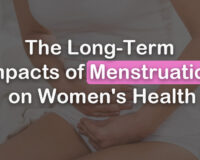Menstruation is a natural process that affects roughly half of the global population. Despite its commonality, its long-term health impacts on women are often under-discussed. Understanding these effects is crucial for promoting women’s health and addressing the challenges of menstruation.
Physical Health Impacts
Here are some physical impacts of Menstruation on Women’s Health:-
1. Anemia: One of the most significant long-term effects of menstruation is anemia, particularly in women with heavy menstrual bleeding. Anemia, caused by a deficiency of red blood cells or hemoglobin, leads to fatigue, weakness, and shortness of breath. Chronic anemia can affect a woman’s overall quality of life and productivity.
2. Reproductive Health Issues: Conditions such as endometriosis and polycystic ovary syndrome (PCOS) have direct ties to menstrual health. Endometriosis, where tissue similar to the lining inside the uterus grows outside it, causes severe pain and can lead to fertility issues. PCOS, characterized by irregular periods and high levels of male hormones, can also cause infertility and increase the risk of developing diabetes and cardiovascular diseases.
3. Bone Health: Estrogen, a hormone involved in menstruation, plays a key role in maintaining bone density. Conditions that disrupt menstrual cycles, like amenorrhea (absence of menstruation) often seen in athletes or those with eating disorders, can lead to reduced estrogen levels. This reduction increases the risk of osteoporosis and bone fractures later in life.
4. Cardiovascular Health: Irregular menstrual cycles and conditions like PCOS can contribute to cardiovascular problems. Women with PCOS have higher incidences of hypertension, dyslipidemia, and insulin resistance, which are risk factors for cardiovascular diseases. Therefore, menstrual health monitoring is essential for early detection and management of these risks.
Mental Health Impacts
Below are some mental health impacts of Menstruation on Women’s Health:-
1. Premenstrual Syndrome (PMS) and Premenstrual Dysphoric Disorder (PMDD): Many women experience PMS, which includes symptoms like mood swings, irritability, and depression. PMDD is a severe form of PMS that can significantly impair daily functioning. Persistent mood changes and depression linked to menstrual cycles can affect a woman’s mental health long-term, leading to chronic mental health conditions if not managed properly.
2. Menstrual-Related Stress: The societal stigma around menstruation and the challenges in managing menstrual hygiene can lead to stress and anxiety. Women in areas with limited access to menstrual products or facilities often face significant stress, affecting their mental and emotional well-being.
Social and Economic Impacts
Let’s discuss some social and economic impacts of Menstruation on Women’s Health:-
1. Educational Attainment: For young girls, menstruation can impact education. Lack of access to menstrual products and facilities in schools leads to absenteeism and poor academic performance. This educational disruption can long-term affect their career opportunities and economic independence.
2. Workplace Productivity: In the workplace, menstruation can affect productivity and attendance. Women experiencing severe menstrual pain or related conditions might need frequent time off, affecting their career progression and financial stability. Furthermore, many workplaces’ lack of supportive policies can exacerbate these issues.
Addressing the Long-Term Impacts
Let’s see how we can address these challenges and impacts:-
- Education and Awareness: Comprehensive education about menstrual health is crucial. This includes teaching girls and boys about menstruation to reduce stigma and promote understanding. Women should be informed about recognizing symptoms of menstrual disorders and seeking timely medical advice.
- Access to Healthcare: Ensuring women have access to quality healthcare for menstrual-related issues is vital. Regular health check-ups, access to gynecologists, and affordable treatment options can help in the early diagnosis and management of conditions like PCOS and endometriosis.
- Menstrual Hygiene Management: Improving access to menstrual hygiene products and facilities, especially in low-income regions, is essential. Governments and organizations must work together to provide affordable or free menstrual products and ensure that schools and workplaces have adequate facilities.
- Workplace Policies: Creating supportive workplace policies can help women manage menstrual health issues without fear of discrimination. Flexible working hours, provision of menstrual products, and the option for menstrual leave are some measures that can be adopted.
Conclusion
Understanding and addressing the long-term impacts of menstruation on women’s health requires a multifaceted approach. By raising awareness, improving healthcare access, and implementing supportive policies, we can significantly enhance the quality of life for women and ensure they lead healthy, productive lives. The conversation around menstrual health must continue to evolve, focusing on immediate concerns and the broader, long-term impacts on women’s overall well-being.





